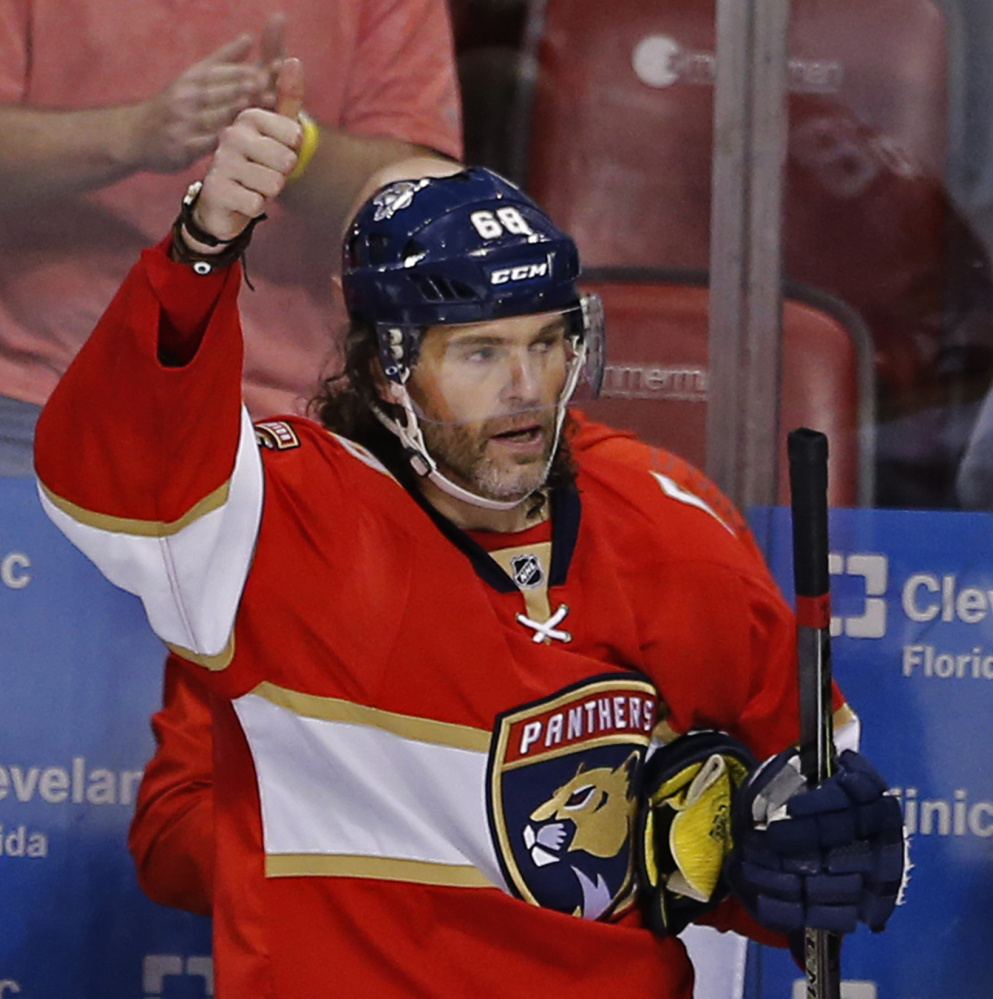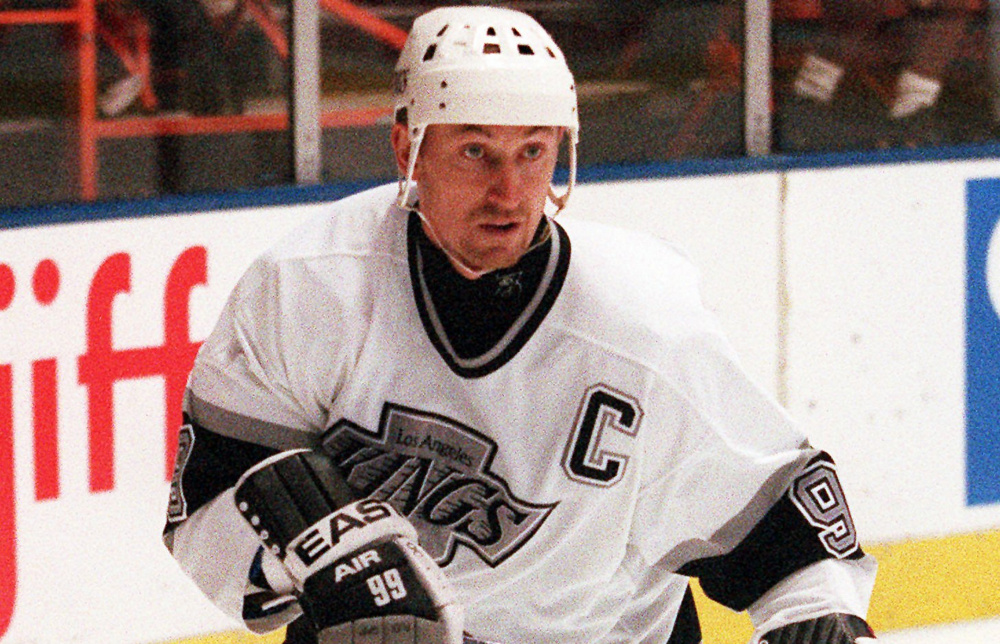The overused sports’ axiom that records are made to be broken just may not apply to pro hockey.
Sure, future generations of athletes are expected to surpass their predecessors because of technological advances in equipment as well as being better educated about nutrition, physiology and exercise.
That said, when 44-year-old Jaromir Jagr notched his 1,888th point Thursday to move into second place all-time behind Mark Messier (but still far behind Wayne Gretzky’s 2,857) it would be hard to imagine that this Mt. Rushmore of hockey legends will be threatened in their lifetimes or even perhaps ever.
Unless there are some major rule changes like shrinking of the goalie’s equipment or widening of the net, the top three all-time goal scorers: Gretzky (894), Gordie Howe (801) and Jagr (755), also seem as reachable as Neptune.
Can they also shrink the slew of 6-foot-6 goaltenders?
From 1985-86 when Gretzky was dominating the sport, until 2015-16, goals per game has dropped from 3.64 to 2.79 per team, and games now include shootouts but those don’t count in the player’s scoring column.
During the same time span, the average single-season points leader (Art Ross Trophy) has dropped from 165 to 106, with Jamie Benn winning it with just 87 in 2015.
When Gretzky was scoring a career-high 215 points in 1986 or potting 92 goals in 1982, 13 players topped 100 points and 22 players scored 40 or more goals in those seasons.
Last season four players topped 40 goals, with Alexander Ovechkin of Washington potting 50. Only Patrick Kane of Chicago reached 100 points with 106. That’s been the norm over the last decade.
Even Jagr, who possesses an Einstein-like grasp of hockey, can’t picture today’s crop of stars such as Kane, Sidney Crosby of Pittsburgh and Edmonton’s teenage phenom, Connor McDavid, being around long enough to challenge the all-time greats.
“It’s a tough question,” Jagr said while stroking his gray stubble as he often does when contemplating. “First of all you have to be very lucky with the injuries. … It looks like it’s a little bit tougher to score goals than it was before because the videos, the preparations of the teams, because of (improved penalty killing).
“There’s not one or two good lines. There are four good lines who can play against the top, top players. There’s little difference on the team between the best players on the team or the worst players on the team, so that way it’s kind of tough. When you look at staying healthy for 20 years in this league, that’s tough to do.”
Jagr, a fitness fanatic who’s fifth in games played at 1,664, has never sustained a serious injury. Because of offensive depth on teams, top-line forwards are only averaging about 19 minutes a game compared to the 24 minutes prolific goal scorers such as Pavel Bure averaged in the late 1990s.
Jagr’s numbers would be much higher but still not Gretzkyesque if he didn’t take three years out of his prime to play in the KHL in Russia or lose another three seasons worth of games due to NHL work stoppages.
“For me it’s like No. 1,” Jagr said. “I don’t really count Wayne Gretzky. He was from another planet.”
New York Islanders Hall of Fame defenseman Denis Potvin believes player movement and lack of long-term line chemistry has contributed to decreased scoring. He also feels that McDavid, who has 42 points in 36 games this season after an injury-curtailed rookie campaign, has an outside shot but not a realistic one.
“McDavid may get 100 points this year and have a 20-year career?” Potvin said. “But he won’t catch Gretzky but possibly the others. It will never happen again because nobody plays with the same players for 10 years.
“What’s unbelievable is Jagr has done this playing on eight different teams. The guys that are ahead of him played on lines with (nicknames) and with the same guys for 20 years. … It’s beyond incredible what Jagr’s accomplished.”
Crosby leads the NHL with 24 goals in 29 games, but at 29 with a history of concussions, his 976 career points trail Jagr by 912, which means that he would need to average 92 points over the next 10 seasons to catch Jagr for second.
Ovechkin, who has won six scoring titles and averaged 51 goals over the past three seasons, has 540 goals and 940 points. But at 31, the Russian great would have to average 36 goals and 156 points over the next six seasons to catch Jagr in both categories. The goals may be doable but not the points.
The Panthers’ 39-year-old forward, Shawn Thornton, who also played with Jagr in Boston, rivals him in fitness and Stanley Cups (two each), if not point production.
“There’s a lot more defense nowadays; goalies are a lot better,” he said. “People block a lot more shots so it will be tough. There’s some good players coming up but again, Jags played for 23 years. Even if you find a player who scores 120 points a year, can he do it for that many years to put him in the mix? … Bobby Orr only played until what, 28? So you never know what’s going to happen?”
Orr, the Boston Bruins’ Hall of Fame defenseman, notched six consecutive seasons of 100-plus points but was never the same after injuring his knee at age 26.
Jagr, who started slow after dropping 20 pounds in the offseason to keep up with the league’s recent trend toward speed and skill over size and brawn, has heated up lately with nine points (19 overall) in his past 10 games.
“The amazing part is we stopped talking about his age,” Buffalo Sabres Coach Dan Bylsma said. “I see the numbers periodically of who he’s passing, guys I thought were untouchable, like (Howe) for sure. Who knows how long he’s going to play to get higher?”
Next on Jagr’s milestone list is former Penguins teammate Paul Coffey, who he trails by one assist (1,134) to tie for fifth all-time. After that he’ll set his sights on Howe’s mark of playing until he’s 51 or beyond.
“I thought I’d be standing here at 35,” Jagr joked of reaching No. 2. “When I was 17 I thought I’d be the best in the world for 20 years. That’s the way I think.
“I always compare it to regular life. Some people die at 60, some die at 100. That doesn’t mean when you hit 70, you don’t want to live anymore. It’s the same for a hockey player. If I got the gift from God and have the ability to do it, I’ll play as long as I can.”
Send questions/comments to the editors.




Success. Please wait for the page to reload. If the page does not reload within 5 seconds, please refresh the page.
Enter your email and password to access comments.
Hi, to comment on stories you must . This profile is in addition to your subscription and website login.
Already have a commenting profile? .
Invalid username/password.
Please check your email to confirm and complete your registration.
Only subscribers are eligible to post comments. Please subscribe or login first for digital access. Here’s why.
Use the form below to reset your password. When you've submitted your account email, we will send an email with a reset code.